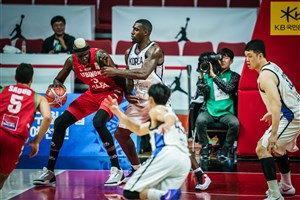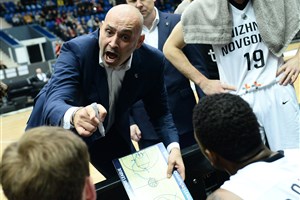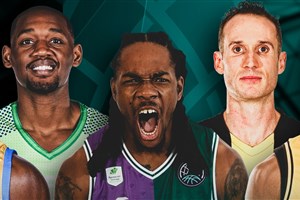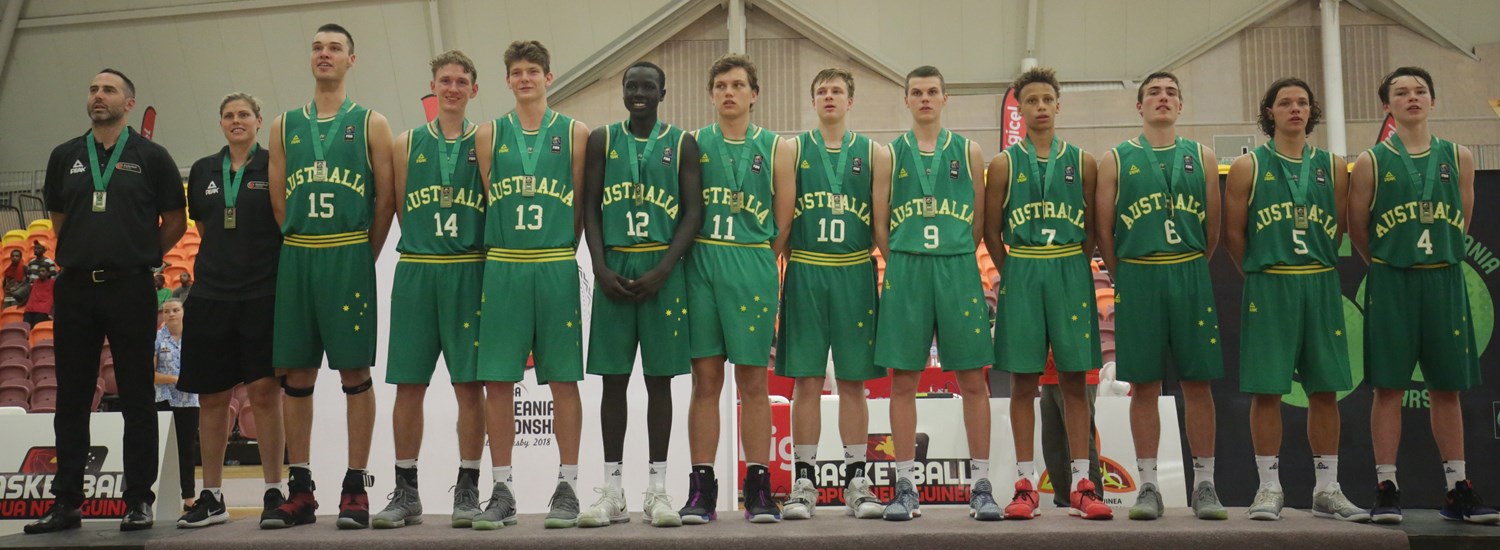
Is Australia’s dominance over New Zealand over?
REGENSBURG (David Hein's Eye on the Future) - The FIBA U15 Oceania Championship might not usually be the place for major statements to be made. But the first-ever edition that just finished might be known as the unofficial end of Australia’s dominance over New Zealand.
Sure, the Crocs beat New Zealand 61-58 in the Final - sending both teams to the FIBA U16 Asian Championship 2019 in what was the first step towards the FIBA U17 Basketball World Cup 2020. But Australia can thank their lucky stars that they beat New Zealand as they were actually out-talented by New Zealand.
Australia needed a meltdown by New Zealand to fight back from a 17-point third quarter deficit to win the title 61-58 in Port Moresby and prevent Australia from getting swept by New Zealand in the tournament after the young Tall Blacks won the Group Phase game 59-57.
Giving the game away
So proud of this group of young men! The first ever u15 FIBA Oceania Champions! Showed some real resilience being down 17 in the third to grind out a big time win against a quality NZ team. Can’t wait for the next stage of the journey in Asia next year #Crocs #FIBAU15Oceania pic.twitter.com/4IeoTU9n45
— Greg Vanderjagt (@Vandy21) December 8, 2018
In the Final, New Zealand failed to score on its first five possessions of the fourth quarter and after a layup still led 55-53 with 2:47 minutes left following nine more empty possessions. Sataan Tawera’s layup gave New Zealand the lead 58-55 with 1:16 minutes from the title. But Morgan Maskell’s team could not score in the final three possessions and Australia nabbed the trophy from New Zealand’s grasp.
That game came two days after New Zealand beat Australia in the group stage - a game which Australia scored the first 9 points and then watched New Zealand counter with the next 13 points. New Zealand failed to execute down the stretch with just 1 point in final 2:45 minutes but Australia just could not come up with enough offense.
Surprising 3-3 head-to-head record
New column @FIBA: @BasketballNZ captain Quinn Clinton speechless after qualifying for U19 Worlds https://t.co/wAveyH4QEz #FIBAU18Oceania
— Luke Sicari (@lukesicari) December 10, 2016
Ask most informed basketball observers and they will say Australia still dominate over New Zealand in Oceania basketball. But that is not the case at all in the youth ranks. FIBA Oceania have included more than just Australia and New Zealand for their youth championships since 2014. And looking back to the FIBA U16 Oceania Championship 2015, FIBA U18 Oceania Championship 2016, FIBA U17 Oceania Championship 2017 and this year’s FIBA U15 Oceania Championship, New Zealand and Australia have an equal 3-3 head-to-head record. New Zealand won one game in 2015 - though Australia won the title. In 2016, New Zealand won 57-51 to qualify for the FIBA U19 Basketball World Cup for the first time and keep Australia out of the global spectacle for the first time. And then the win in Papua New Guinea in the group stage.
Australia with promising talent 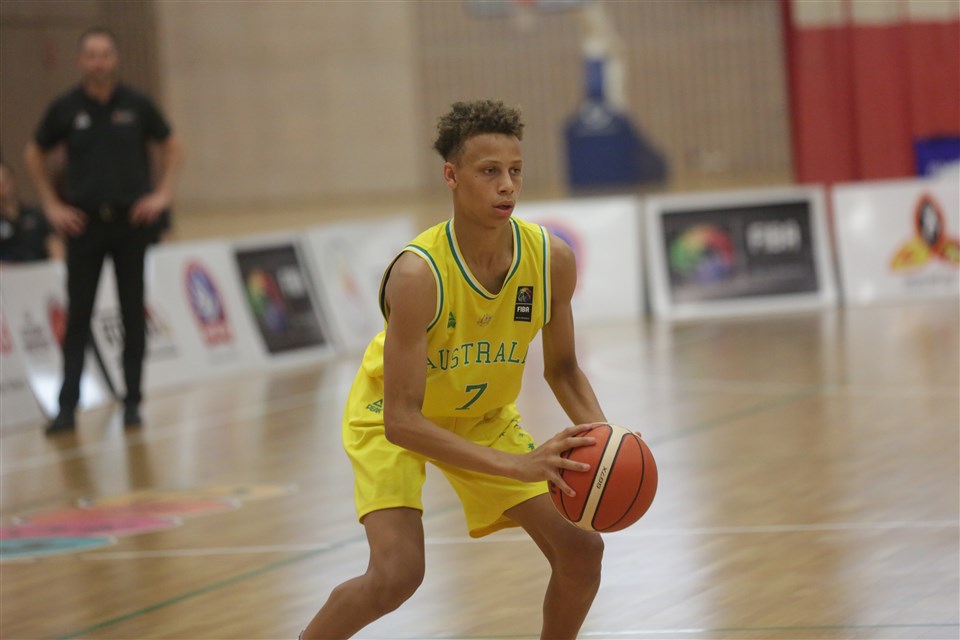
Australia talent Dyson Daniels already has a nice skillset for Australia and a frame that will fill out as he gets older.
Australians Joshua Duach and Jack McWilliams both made the All-Star Five as did the New Zealand duo Tafara Gapare and Joshua Book with Moses Bartley of third-placed Samoa being the final selection member.
McWilliams is a 7-footer (2.13m) at age 15 who definitely has some skills to work with and develop - and you just can’t teach that height. Duach is an athletic and physically strong wing who showed he can take over responsibility in big games - picking up 15 points and 4 rebounds and 14 points and 5 rebounds in the two games against New Zealand. But Dyson Daniels is another promising prospect from this Crocs group with good skills offensively and defensively though he struggled from the outside. And Marcus Windhager was a solid point guard.
MVP Gapare has a fan in Steven Adams
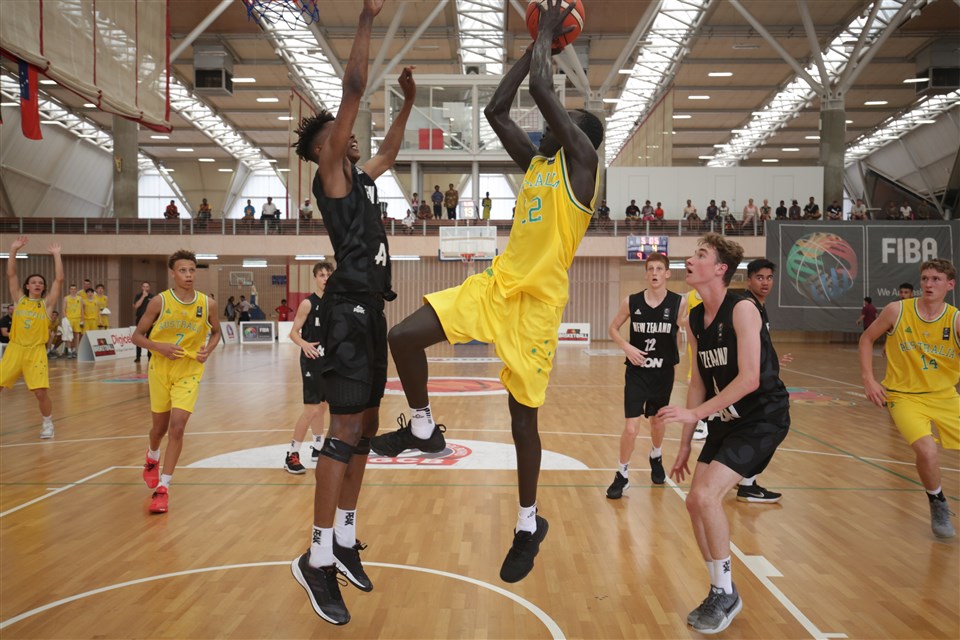 Get used to seeing these two going at it: New Zealand's Tafara Gapare and Joshua Duach of Australia.
Get used to seeing these two going at it: New Zealand's Tafara Gapare and Joshua Duach of Australia.
The 6ft 7in (2.01m) Gapare took home MVP honors and deservedly so as he was the best player in the tournament - and possibly has the brightest future. The wing has already a major supporter with a big name - namely Steven Adams. The New Zealand NBA star in 2014 granted Gapare the Steven Adams Scholarship to pay for his education at Scots College and any costs associated with the academy - a worth of 130,000 dollars over seven years. Adams in July 2013 also reportedly donated a pair of shoes to raise money to fund Gapare’s trip with the academy to play basketball in the United States for a week.
New Zealand with more talent?
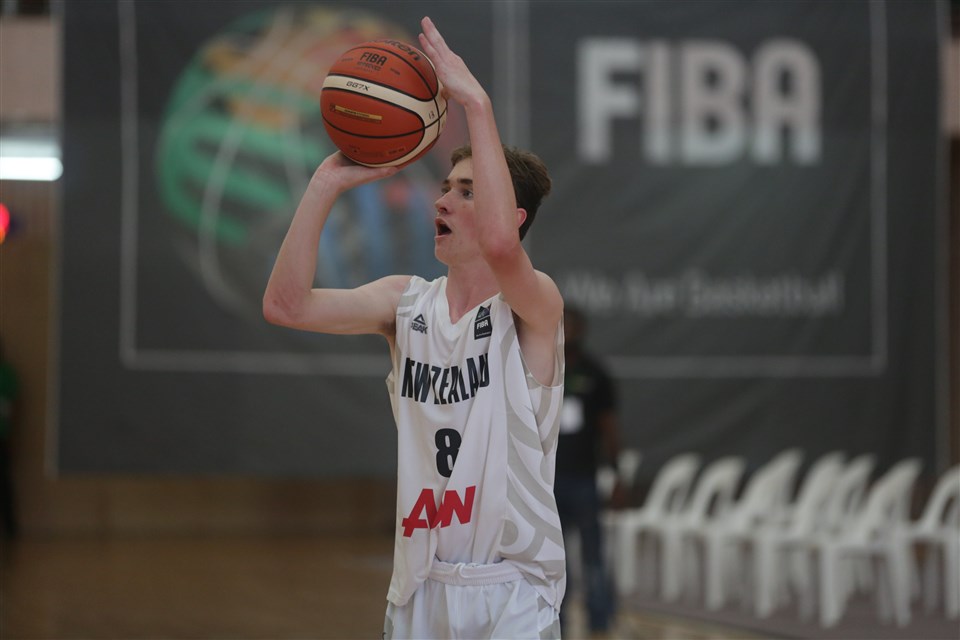 Joshua Book was named to the All-Star Five of the tournament for his all-around play.
Joshua Book was named to the All-Star Five of the tournament for his all-around play.
But this New Zealand team was much more than just Gapare. Book made the All-Star Five for his excellent all-around play. Hunter Adam showed some promise as an athletic big man while Levick Kerr has the making of a solid low post presence. Benjamin Gold meanwhile is a lanky 6ft 5in (1.96m) forward who came up with a number of big effort plays at both ends - including 4 offensive rebounds in the win over Australia and 1.0 steals per game. There is a lot of talent in Gold that could be tapped into.
Samoa take third place over Guam - thanks to Australia and New Zealand
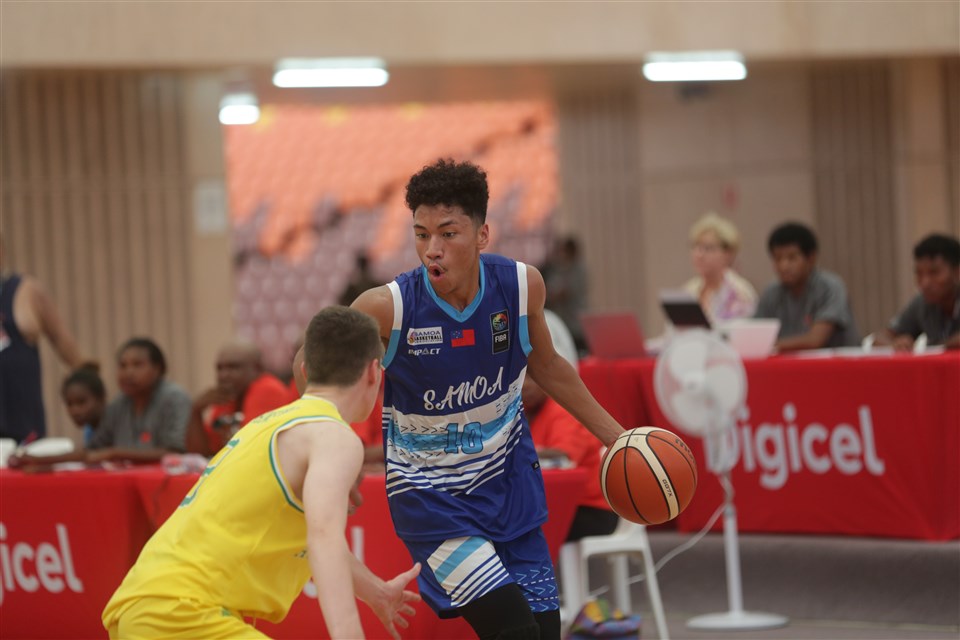 Samoa's Moses Bartley goes against Australia - his home country.
Samoa's Moses Bartley goes against Australia - his home country.
As is always the case at FIBA Oceania tournaments, there is a battle for the best non-Australia or New Zealand team in the region. Guam had slowly built up as the top next-best team, finishing third at the FIBA U18 Oceania Championship 2016 and FIBA U17 Oceania Championship 2017 - losing only to the two regional superpowers in those tournaments. In fact, Gabriel Simon scored 22 points as Guam nearly pulled off one of the biggest upsets in youth international basketball history at the U17 tournament last year, losing just 90-78 to New Zealand. If New Zealand had lost that game that would have meant that only Australia or New Zealand would have reached this summer’s FIBA U18 Asian Championship 2018.
My column on Guam nearly pulling off one of the biggest upsets in hoops history v New Zealand at #FIBAU17Oceania https://t.co/83H65kHDSk
— David Hein (@heinnews) July 20, 2017
Samoa won the fight this time around with two wins over Guam - 85-63 in the group stage and 74-52 in the Third Place Game. While Guam used five players born outside of Guam in 2017, the team was all Guam-born this time around. And it ended up being no match for a Samoa team that featured exclusively players born in Australia and New Zealand. There were eight players on the Samoa team from New Zealand and three from Australia, including the New South Wales native Bartley, who averaged 20.2 points including 30 points against Guam in the group stage and 20 in the game for the podium spot. He also had 21 points and 7 rebounds in the game against his native Australia.
Look ahead to 2019
Australia and New Zealand will now head off to the FIBA U16 Asian Championship 2019 - with hopes of both playing at the U17 World Cup for a second straight time. And New Zealand will be out for a bit of revenge for giving up their chance of sweeping Australia.
Next year will also see the region come back together as a whole for the FIBA U17 Oceania Championship 2019 with the long-term goal of the FIBA U19 Basketball World Cup 2021. And we will get to see if New Zealand have in fact ended Australia’s dominance.
David Hein
FIBA
FIBA's columnists write on a wide range of topics relating to basketball that are of interest to them. The opinions they express are their own and in no way reflect those of FIBA.
FIBA takes no responsibility and gives no guarantees, warranties or representations, implied or otherwise, for the content or accuracy of the content and opinion expressed in the above article.





